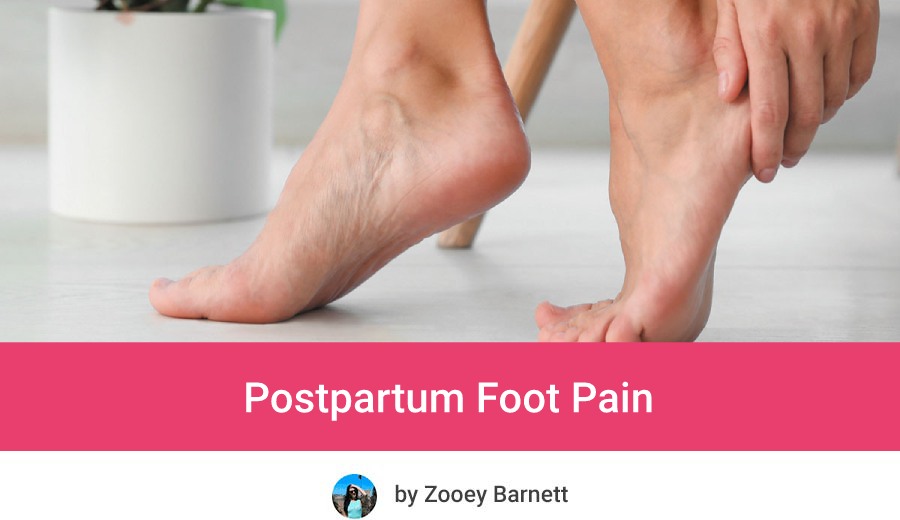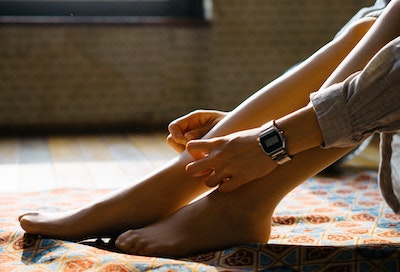
Pregnancy and childbirth is associated with a number of positive emotions for mothers, but experiences vary from one woman to another. During pregnancy your body goes through a lot of physiological changes ranging from morning sickness, fatigue, weight gain, pica to painful feet and ankle.
Lots of pregnant women during third trimester and new mothers experiences foot arch pain or related issues1 due to added body weight from the growing baby, that puts pressure on your feet and toes. Other contributing factors to flattening arch of the foot and foot pain include hormone relaxin and planter fasciitis.
Apart from painful feet, common complaints stated by most postpartum mamas are: calf pains, low back pain, swollen feet and ankle and neck and jaw pain. Numbness or tingling in the feet might occur due to limited blood flow to lower extremities. You might have problems standing and walking especially in the morning.
Unfortunately, dealing with postpartum foot and ankle pain may be really frustrating and make you feel overwhelmed, especially when you have a newborn baby to take care of (not to mention a toddler to run around after!).
In postpartum period your body is recovering from all the physiological changes that it went through to return to its pre-pregnant state.
Recovering from pain takes time and the discomfort you experience can make the first few weeks and months after birth really difficult.
But instead of focusing on that frustration and feeling hopeless, focus on healing.
You should focus on eating a well-balanced diet, wearing supportive shoes, keep your self hydrated. And don’t be afraid to ask for help and accept the support from your family.
This article is not a substitute for medical advice.
What Is Postpartum Foot Pain?
Let’s talk about anatomy a bit.
Fascia is a structure that supports and separates your muscles, and it is attached to the heel and spread to the toes and then to the rest of the body2. Rapid increase in strain on your arches causes small rips and tears.
Planter fascia lead to swollen and painful muscles, if untreated heel spurs may arise. Many women continue to experience increased stress muscles during postpartum due to weight loss following the birth of the baby.
Postpartum foot pain is related to loose ligaments in the foot, leading to irrational arches and pain that make it difficult in standing and walking3. There is increased pressure and weight to the feet causing arches to fall and reduced circulation causing tissue inflammation.
Why Do My Feet Hurt After Pregnancy? – Causes Of Postpartum Foot Pain
- Relaxin
During pregnancy your body produces hormone relaxin in large amount which is intended to relax the ligaments of your pelvis. It’s function is to help to accommodate the growing baby and prepare for birth. Relaxin alters the functioning of cartilage and tendons by activating collages. It also alters ligament laxity of the foot hence flattening of your arch.
- Weight Gain
During pregnancy, you gain weight due to your growing baby, and your body gravity center changes too. The pain arise as your foot compensates the growing demand.
- Plantar Fasciitis
Plantar fasciitis is a medical condition where strain is placed on the plantar fascia ligament causing heel spurs and pain.
Is Foot Pain After Pregnancy Caused By Plantar Fasciitis?
Yes, foot pain after pregnancy can be caused by plantar fasciitis.
The flattening of the arch during pregnancy exerts extra weight on the plantar fasciitis hence causing your feet (especially heel) to hurt. Fallen arch are common after giving birth as a result of increased laxity in ligaments and weakness of supporting muscles.

Is Postpartum Foot Pain Normal & Common?
Postpartum foot pain is normal and common especially in first pregnancy. It may start as early as the first trimester, but it’s most common during third trimester and postpartum. This is as a result of high levels of relaxin hormone in your blood stream and added weight from the growing baby estimated at 25 to 35 pounds4.
What Helps Foot Pain After Pregnancy?
- Wear Tight Socks
Although they are not commonly used, they tend to help improve circulation to the feet. The fluid moves from the intracellular to the intravascular, to help in managing inflammation which includes swelling and pain in calf muscles. It also helps in exerting pressure on swollen ankles.
- Massage
Massage produces mechanical pressure and stretch, which increases muscle compliance resulting in increased range of joint motion, as well as decreased active stiffness. It also contributes to increased blood flow.
It is also recommended to roll a tennis ball around the ankle and arch of your feet.
- Wearing Supportive Shoes
It is recommended to invest in shoes that are designed to give added foot support and cushion, to alleviate pain associated with plantar fasciitis.
- Elevate Your Feet Up
Sounds basic, but it is very important and helpful in fluid shifting. Fluid accumulated in the legs will move to the rest of the body by gravitation force. Keeping your legs and feet elevated for a couple of hours using pillows may be really helpful.
- Stretching
Muscle stretch helps boost flexibility, which is ideal for improving both short-term and long-term range of motions. Stretching your legs is important and always remember to massage the feet and toes.
- Physical Therapy
Physical therapist plays a big role to address structural changes that take place in your body during postpartum. You can plan with your physiotherapist exercises that will work best for you. Some women may prefer doing the exercises in the comfort of their home.
- Diversion Therapy
This kind of therapy is all about leisure and recreational experiences. Focus on something that relieves the pressure off your feet.
- Food
Some anti-inflammatory and body building foods help in preventing foot and ankle pain. These foods include meat products, dark green leafy vegetables, berries and tomatoes.
- Medication
Medications such as ibuprofen are safe for postpartum women to treat foot and ankle pain. But you must always seek health care providers information before taking any medication.
Tips For Taking Care Of Your Feet After Giving Birth
- Drink a lot of water to prevent dehydration (which makes the body hold on extra water thus causing swelling).
- Maintain a balance between water and sodium (it is advised to avoid salt as it retains water).
- Do light exercises that may prevent pain, swelling and related symptoms.
- Use custom orthotics, specially made devices designed to support and comfort your feet. Custom orthotics can be helpful to support changing foot structure5.
- Foot massage helps to keep the muscles of the arch pain-free.
- Avoid maintaining the same posture for a long period of time.
- Apply cold compression to your swollen and painful feet.
- Wear shoes that support your feet.
How Long Does Postpartum Foot Pain Last?
Without any treatment it may go up to 18 months after giving birth and may cause structural changes in your feet and supporting tissue if ligaments are affected.
How Long Does Postpartum Plantar Fasciitis Last?
Pregnant women experience plantar fasciitis as early as the first trimester. Postpartum plantar fasciitis may last 6-12 months until your feet to get back to normal after giving birth to your baby.
Planter fasciitis can be very difficult to manage. Collapsed arches (which are common in pregnancy) and ligament laxity contribute to planter fasciitis, that is hard to get rid of during postpartum6.
Will My Feet Go Back To The Same Size After Pregnancy?
Your feet are likely to to go back to their normal shape after pregnancy. The swelling in your feet is expected to go away within the first month after giving birth. Any spreading caused by loosening ligaments is permanent. To help your feet return to its pre-pregnant state, try wearing supportive shoes. Unfortunately, for some women it may mean changing the whole shoe collection!
When To See A Doctor?
Women should see a doctor if:
- Foot pain comes suddenly,
- The pain persist over a long period of time,
- The whole body starts swelling,
- Pain worsens in the morning and is centralized in the heel region,
- They experience unresolved pain, skin redness, itching, or increased swelling in one leg as it may indicate a blood clot.
The purpose of this article is informative. It’s not a substitute for professional medical advice or medical care. Remember: safety first! Consult your doctor/pediatrician in case of any doubts. The author of this article does not accept any responsibility for any liability, loss or risk, personal or otherwise, incurred as a consequence, directly or indirectly, from any information or advice contained here.
Resources:
https://pubmed.ncbi.nlm.nih.gov/
https://www.wonderbaby.org/
https://www.londonfootandanklecentre.co.uk/
https://ohmymamabody.com/
https://palermophysio.ca/
https://resetwithus.ca/

